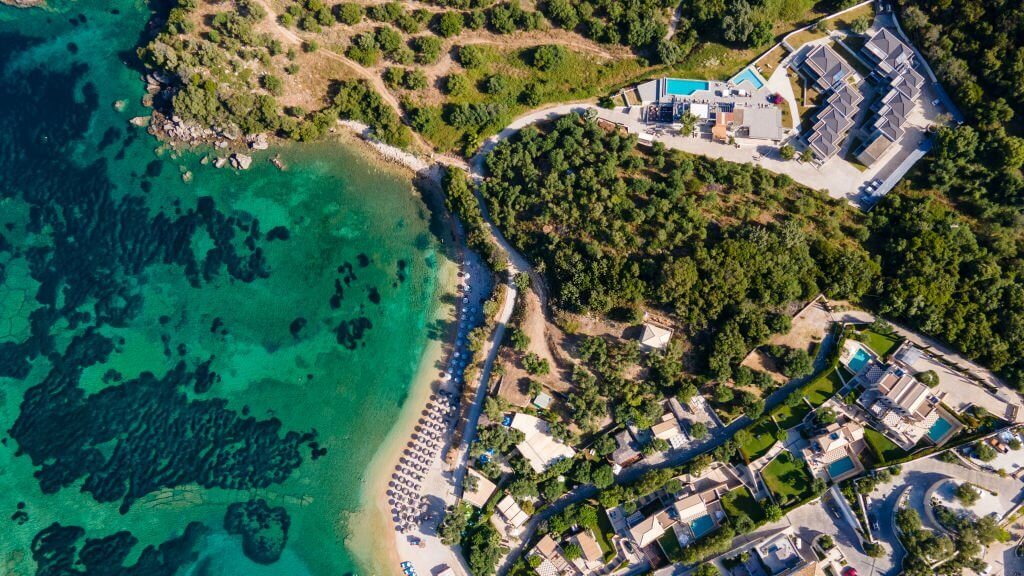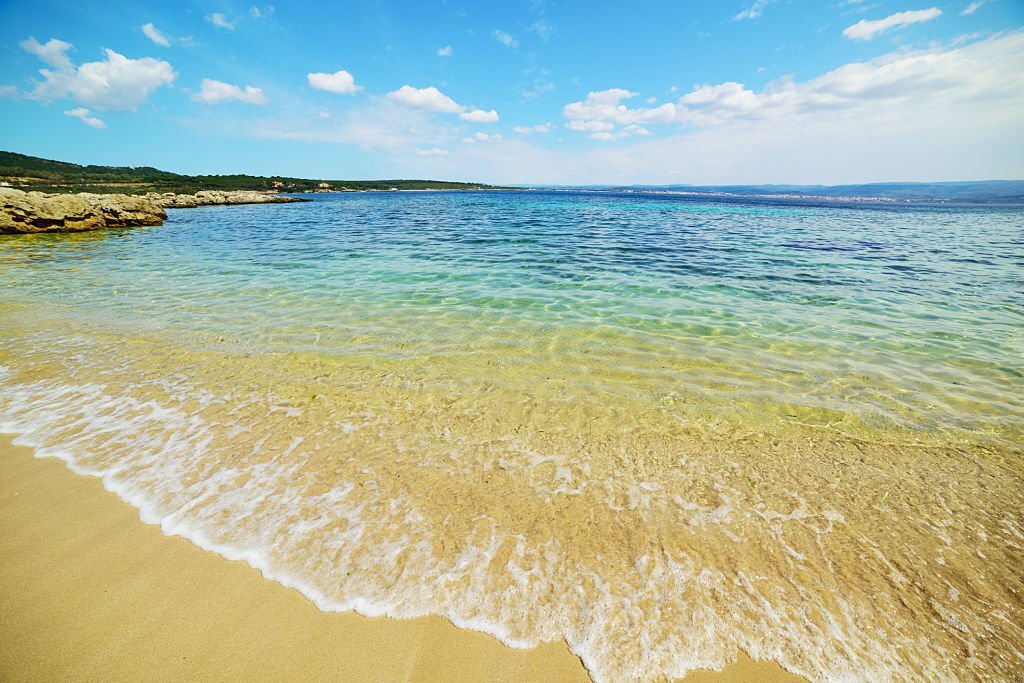Agia Paraskevi Beach is a well-known coastal destination celebrated for its natural springs, clear waters, and ambience, making it a favoured choice for visitors seeking a peaceful seaside experience. Located on the peninsula’s western coast, Agia Paraskevi Beach features a beautiful landscape with a mountainous backdrop and inviting shoreline. Agia Paraskevi Beach is primarily known for its therapeutic natural springs, which are believed to have healing properties. These springs are a notable feature of the beach, and visitors often enjoy bathing and relaxing in the warm, mineral-rich waters. Its shallow waters and pebbly shoreline are ideal for families and those looking to unwind in a well-organized, peaceful environment. Additionally, Agia Paraskevi Beach is favoured for its picturesque surroundings and the presence of traditional Greek taverns serving local snacks and drinks.
The climate at Agia Paraskevi Beach is typical of the Mediterranean region, with hot, dry summers and mild, wet winters. Summers, from June to September, offer ideal beach weather, with temperatures ranging from 25°C to 35°C (77°F to 95°F), making it perfect for swimming and outdoor activities. The area’s geography features a combination of mountainous terrain and a pristine coastline. Hiking trails in the vicinity allow visitors to explore the lush greenery and unique landscapes of the Kassandra peninsula. To reach Agia Paraskevi Beach, travellers can take the E65 highway from Thessaloniki, heading south towards the Halkidiki region. Upon entering the peninsula, they should follow the signs leading to Kassandra and continue along the main road to reach Agia Paraskevi. Alternatively, visitors can choose taxis or buses from Thessaloniki, which also provide access to the beach town. While public transportation is available, many find renting a car beneficial for exploring the surrounding areas and enjoying the convenience of getting to Agia Paraskevi Beach.
What is Agia Paraskevi Beach?
Agia Paraskevi Beach is a popular coastal destination in Halkidiki, Greece. Its Blue Flag recognition signifies its high environmental and safety standards. It features an excellent setting with crystal-clear shallow waters and small pebbles, making it an excellent choice for families seeking a peaceful and well-organized beach experience. Besides its inviting shoreline, Agia Paraskevi is famous for its natural springs, which have warm, healing properties. A path from the springs to the seaside cave offers visitors an opportunity for exploration. The locals consider this beach an exceptional diving location on the Kassandra peninsula, further enhancing its appeal.
Agia Paraskevi Beach is primarily known for its thermal baths and the therapeutic qualities of its spring waters. Over time, it has evolved into a peaceful and family-friendly coastal destination. In addition to its natural charm, visitors can enjoy the scenic mountainous landscape surrounding the area. Traditional Greek taverns nearby offer a chance to savour delicious local snacks and beverages.
Agia Paraskevi Beach is situated on the Kassandra peninsula, which is part of the larger Halkidiki region in Greece. To reach Agia Paraskevi Beach, travellers typically follow these directions. From Thessaloniki, one would head south on the E65 highway, which leads to the Halkidiki region. After entering the peninsula, follow the signs to Kassandra and continue on the main road leading to the peninsula’s western side. Agia Paraskevi Beach is located on the western coast of Kassandra, near the town of Agia Paraskevi. Travellers should follow the road signs to the town, and from there, the beach is easily accessible on foot or by car within the town.
How does the Agia Paraskevi Beach Map look?
Find below on the image a map of Agia Paraskevi Beach.
What are the activities in Agia Paraskevi Beach?
Agia Paraskevi Beach offers 3 significant activities that cater to different interests. Firstly, swimming is popular at Agia Paraskevi Beach due to its clear, shallow waters. The gentle gradient of the seabed ensures that the waters are safe, even for novice swimmers or families with children. Its peaceful environment, combined with the warm and inviting sea, makes it an ideal location for visitors to relax and take a refreshing dip, enjoying the Mediterranean sun. Secondly, snorkelling is another favoured pastime at Agia Paraskevi Beach. The clean and transparent waters provide an excellent opportunity to observe marine life up close. Its rocky areas and underwater terrain offer various fish and sea creatures habitats. Thus, visitors often come equipped with snorkels and masks to explore the underwater beauty and witness the vibrant aquatic ecosystem firsthand. Lastly, hiking is an activity that attracts many to the region surrounding Agia Paraskevi Beach. It is surrounded by lush greenery and a mountainous landscape. Trails leading from the beach, such as the one to the seaside cave, allow experts to trek and discover natural wonders. The diverse terrain and scenic vistas ensure that hikers are rewarded with breathtaking views and an enriching experience as they explore the unique features of the Kassandra peninsula.
When is the best time to visit Agia Paraskevi Beach?
The best time to visit Agia Paraskevi Beach is from May to June in the late spring and early summer months. The weather is warm and pleasant during this period, and the sea temperatures are comfortable for swimming and snorkelling. Moreover, this timeframe falls just before the peak tourist season in July and August, making it less crowded and more peaceful for visitors to enjoy the beach without the bustling crowds. Accommodations and services are also more readily available, and the area’s natural beauty is at its prime with blooming vegetation.
To avoid the crowds entirely, the ideal time to visit Agia Paraskevi Beach would be in the shoulder seasons of late September and early October. During this period, the weather remains favourable for outdoor activities, and most tourists have returned home, resulting in a serene and quiet beach experience. However, it’s essential to note that some facilities and businesses might start closing down as the tourist season winds down, so travellers should plan accordingly for limited amenities.
How was the preservation of Agia Paraskevi Beach?
The preservation of Agia Paraskevi Beach has been actively managed through various measures. Local authorities and environmental organisations have enforced strict regulations to maintain its natural beauty and ecological integrity. These efforts include waste management initiatives to ensure the beach’s cleanliness, regular clean-up campaigns, and the installation of waste bins for visitors to dispose of their litter properly.
The Blue Flag designation awarded to Agia Paraskevi Beach also signifies its commitment to sustainability and environmental protection. Ongoing water quality monitoring and safety assessments are conducted to retain this prestigious status. These preservation initiatives and public awareness campaigns emphasise the importance of responsible tourism and the conservation of Agia Paraskevi Beach for future generations.
What are nearby attractions in Agia Paraskevi Beach?
Listed below are the best attractions near Agia Paraskevi Beach:
- Thermal Spa Agia Paraskevi: Thermal Spa Agia Paraskevi is famous for its therapeutic waters, which are believed to have healing properties. Visitors often frequent the spa to indulge in treatments and bathe in the natural spring pools. It has modern amenities, offering a serene atmosphere for relaxation and rejuvenation. It’s a popular destination for those seeking wellness experiences during their stay in the area. With its combination of nature and wellness, the spa is an attraction not to be missed.
- Folklore Museum of Afitos: Situated in Afitos, a short drive from Agia Paraskevi Beach, this museum showcases the region’s rich cultural history. Exhibits feature artefacts, photographs, and historical items depicting local life and traditions. It offers an educational experience, helping visitors understand the heritage of Halkidiki. Its quaint setting in a traditional stone-built house further enhances the authentic atmosphere. It’s an ideal spot for history buffs and those looking to immerse themselves in Greek folklore.
- Kalithea Beach: Just a few kilometres from Agia Paraskevi Beach, Kalithea Beach is another stunning coastal destination in the Kassandra peninsula. Known for its pristine sands, turquoise waters, and vibrant beach bars, it’s a hotspot for relaxation and entertainment. Kalithea Beach hosts events, parties, and various beach activities for visitors. Its proximity to the Temple of Ammon Zeus historic site adds an archaeological dimension to its appeal. For those seeking a lively beach experience combined with historical intrigue, Kalithea Beach is a must-visit.
How do you get to Agia Paraskevi Beach?
To get to Agia Paraskevi Beach, several transportation options are available. By car, travellers starting from Thessaloniki should head south on the E65 highway towards the Halkidiki region. As they approach the Kassandra peninsula, they should continue on the main road that leads to the western side of the peninsula, following signs for Agia Paraskevi. Once in the town of Agia Paraskevi, the beach is easily accessible, with enough parking areas for convenience. Those opting for a taxi can hire one directly from Thessaloniki. It’s essential to communicate the destination clearly to the taxi driver and ensure the fare is agreed upon beforehand or that the meter is running. The taxi will take the same E65 highway and the same route to Agia Paraskevi Beach. Regarding the bus option, visitors can catch a bus from Thessaloniki’s main bus terminal that heads towards Halkidiki. Buses that serve the Kassandra peninsula will typically have stops in major towns, including Agia Paraskevi. Upon arrival in Agia Paraskevi town, the beach is a short walk or taxi ride away. Renting a car can be particularly beneficial for visitors to the region. It offers flexibility, allowing visitors to explore the Kassandra peninsula at their own pace and access more secluded areas that might be challenging to reach via public transportation.
What are the factors to consider before renting a car in Thessaloniki?
Listed below are the factors to consider before renting a car in Thessaloniki.
- Insurance: Car rental insurance is important, as it protects a passenger against the cost of damage when renting a car. Most Thessaloniki car rentals includes insurance for collision damage waiver, and a driver’s credit or debit card is required as a guarantee.
- Driver’s age: The legal age requirement when driving in Thessaloniki is 18. The driver must have a valid driving licence and essential documents like an ID or passport.
- Driver’s gender: Both women and men can drive in Thessaloniki. As long as the driver is of the legal age of 18, driving is permitted in Thessaloniki, regardless of gender.
- Car type: Travelling with groups or family members requires a much bigger car. Car rental companies in Thessaloniki offer a variety of vehicles to choose from. Selecting a smaller car is best when driving in Thessaloniki. The reason for that is that some Greek roads are narrow. The car type is one important factor in how to choose the right car to rent in Thessaloniki.
- Documents needed for renting a car: One important document required for renting a vehicle is a valid driving licence. However, a credit or debit card may also be presented, including a passport or an ID card.
How much does a car rental in Thessaloniki cost?
Thessaloniki is best travelled using a rented vehicle. Tourists may quickly get to Thessaloniki’s top destinations using a rented car. Thessaloniki car rental costs vary depending on the number of persons, itinerary, car type, destination, and duration. The average cost of renting a car in Thessaloniki is around €30 to €40 per day. A car rented for a whole week will cost an average of €250. Renting a vehicle for the weekend will cost around €78. Thessaloniki car rental rates differ depending on the car type. Car rental companies offer a variety of cars depending on customers’ liking. Most car rental shops in Thessaloniki provide an online booking system whenever customers want to book a car. Simply follow the process and instantly book a vehicle on their website. Before availing of a rental car service in Thessaloniki, check and secure all the requirements.
How much does it cost to get to Agia Paraskevi Beach?
Agia Paraskevi Beach typically does not have an admission fee, making it accessible to the public for free. Visitors can enjoy the beach without incurring any entrance charges. Food prices at the nearby taverns and restaurants can vary depending on the establishment and the items chosen from the menu. On average, a meal at a mid-range restaurant in the area might cost around €15 to €25 per person, excluding drinks. However, prices can fluctuate based on individual preferences and dining choices. Car rental rates from companies like Potos Car Rentals typically start from about 35-45 euros per day. Taxi or private transfers cost more, averaging 100 euros for a one-way trip. Parking fees, if applicable, may differ based on the specific parking area chosen near the beach. It’s advisable to check for posted parking rates or inquire locally about the cost of parking in the vicinity of Agia Paraskevi Beach. Some accommodations or beachfront establishments may offer free or discounted parking for their clients.
Where to stay near Agia Paraskevi Beach?
Listed below are the best hotels to stay near Agia Paraskevi Beach:
- Maison La Mer: Maison La Mer offers comfortable rooms and apartments. Accommodations are equipped with modern amenities, including air conditioning and Wi-Fi. It features a garden and a terrace for guests to relax. Maison La Mer provides free parking for guests, ensuring convenience. Depending on the room type and season, average rates can range from €60 to €120 per night.
- Theasea: Theasea offers a range of room types, including studios and apartments. Each unit is well-furnished and includes a kitchenette for self-catering. Guests can enjoy the outdoor swimming pool and sun terrace. Theasea provides free on-site parking for guests. Rates at Theasea start from €70 per night.
- The Ocean Beach House: The Ocean Beach House offers beachfront accommodations with sea views. Rooms are elegantly decorated and include private balconies. It has a restaurant, a bar, and a garden. Free parking is available on-site for guests. Prices for rooms at The Ocean Beach House start from €80 to €150 per night.
- Hotel Loutra Beach: Hotel Loutra Beach provides comfortable rooms with balconies. It features a restaurant serving Greek cuisine and a bar. Guests can relax in the garden or on the sun terrace. On-site parking is free, with average rates for rooms ranging from €70 to €120 per night, depending on the season and room type.
Where to eat near Agia Paraskevi Beach?
Listed below are the best restaurants near Agia Paraskevi Beach:
- Navy Bar Bussola: Navy Bar Bussola offers a selection of beverages and light snacks. It is primarily known for its refreshing cocktails and panoramic sea views. The venue provides a relaxed ambience, making it perfect for evening hangouts. A typical drink here might cost between €6 to €12, depending on the choice. Along with drinks, guests can expect to find a range of snacks with prices averaging €5 to €10.
- Remezzo Cafe and Restaurant: Remezzo Cafe and Restaurant serves a mix of traditional Greek dishes and international cuisine. It’s known for its delicious seafood options and warm, inviting atmosphere. The outdoor seating allows diners to enjoy their meal with a view. Main dishes typically range from €10 to €25. Their dessert selection is also popular, with prices averaging around €5 to €8.
- L.A.P. Grillhouse: L.A.P. Grillhouse is famous for its grilled meats and classic barbecue offerings. It creates a rustic, cosy setting ideal for meat lovers. Their signature dishes often include various cuts of lamb, pork, and beef. A main dish can range in price from €10 to €20. They also serve a selection of local wines and beers to complement the meal.
- Captain Fish Tavern: Captain Fish Tavern specialises in seafood dishes, using fresh catches of the day. It has earned a reputation for its authentic Greek seafood preparations. Diners can expect dishes like grilled octopus, fresh fish, and seafood pasta. Main courses at this tavern typically cost between €12 to €28. Given its popularity, booking a table in advance during peak seasons is often advisable.
Is Agia Paraskevi Beach worth visiting?
Yes, Agia Paraskevi Beach is worth visiting. It offers a serene coastal experience with clear waters and a well-organized environment, making it an excellent choice for families and those seeking relaxation. Natural springs with reputed healing properties add a unique dimension to the beach, and the surrounding mountainous landscape and nearby attractions, such as thermal spas and cultural museums, enhance its appeal.
Is Agia Paraskevi Beach safe?
Yes, Agia Paraskevi Beach is safe for visitors. It adheres to standard safety measures commonly found at popular tourist destinations, including lifeguards during peak seasons and clearly marked swimming areas. The shallow waters and gradual seabed slope make it suitable for families with children. However, as with any beach, visitors must exercise caution, follow safety guidelines, and be aware of local conditions such as currents and tides.
Do you need to book in advance to visit Agia Paraskevi Beach?
No, visitors typically do not need to book in advance to visit Agia Paraskevi Beach. It is a public beach, and access is generally open to all without the need for reservations or tickets. Visitors can arrive at the beach and enjoy its amenities on a first-come, first-served basis. However, for accommodations, such as hotels or vacation rentals in the vicinity, making reservations in advance, especially during peak tourist seasons, is advisable to secure lodging and potentially better rates.
Are children permitted at Agia Paraskevi Beach?
Yes, children are permitted at Agia Paraskevi. Agia Paraskevi is undeniably one of the best beaches in Thessaloniki, and it holds a reputation as a family-friendly destination. The shallow and calm waters at the beach make it suitable for young swimmers, and the well-organized facilities provide convenience for families. However, parents or caregivers must supervise children at the beach to ensure their safety and well-being, as is customary at any seaside location.



 German
German Greek
Greek Română
Română Polski
Polski


